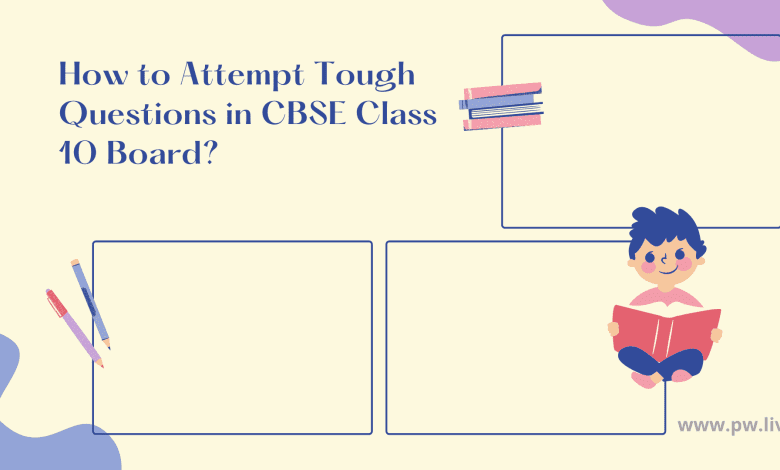How to Attempt Tough Questions in CBSE Class 10 Board?

As students are heading toward CBSE Class 10 Board exam 2022, there is a common question in every student’s mind “How to answer tough questions in board exam.” What are the tips and strategies to solve these questions?
We think it’s a genuine question, and in this article, we will share some tips and strategies to solve tricky questions in the board exam.
Strategy to Solve Tough Questions
1. Use the first 15 minutes, and read the question paper.
You get 15 minutes in the starting to just read the question paper. Use this time just to read the question paper and understand it. Read all the questions in these 15 minutes. While reading, analyze the questions and divide them into easy, moderate, and tough categories. After doing this, you will have a rough idea about the questions and make a rough plan.
In the examination hall, the first thing is to read your question paper well and understand it. Before writing an answer, you must first understand what is being asked and how many marks it contains. You should write your answer according-logical and comprehensive.
2. Prioritize your attempt
It is a must-to-do step. While reading the question paper, prioritize the questions. Always attempt easy questions first, then move on to the moderate ones and make sure that you complete all the questions before taking the tough ones. It will ensure that you are not leaving any questions unanswered that you know.
Once you complete the easy and moderate questions, you will be more confident. And you will be mentally ready to take the tough questions and succeed.
3. Do not overthink a question.
It is essential to think about the question before answering it. But not to that point where you have wasted a lot of time on just one question.
Also, just because a question is simple and familiar doesn’t mean you need to write a long answer. Remember, you only need to answer the questions. Excessive attempts are a waste of time.
4. Do not worry too much about tough questions.
The moment you find a few difficult questions, it is natural for you to start worrying about them. It is not necessary and will only harm your performance.
They may seem a bit rigid, but you will find many of them much lighter once you get into them. So be happy with the reference and do not worry unduly about the stricter lot.
• Read the question twice: Before you start answering, it’s essential to understand the question. Try to understand what the examiner is looking for on that question.
• Do not give too much time to a single question: If you think multiple questions are tough to answer, count them and divide this number into the number of minutes you have left for the exam. This will give you an estimate of how much time you should spend on each question.
• Avoid getting stuck: If you notice that you are stuck on one particular answer, or spending too much time on that question, move on to the next question. You can come to this question at the end of the test and fill in anything you missed.
To avoid this, you should take help from ncert solutions for class 10. These are well-summarized NCERT solutions for all the subjects. That will take less time to cover all the topics.
> If you spend too much time on a single question, you may run out of time to answer the rest.
> Sometimes when you skip a question and continue to answer the rest of the test, you may jog your memory and remember the answer to earlier questions.
- Plan your answer before you begin: This is another point that most students forget. Plan your answer in a structured way. Outline the main points, dates, names, formulas, and anything you can remember when writing down your answers. Then select the most relevant facts when writing your answer.
- Keep your answer concise and straightforward: Stay on point, and use simple language to explain the concepts and ideas. Avoid large introductory or summation passages. Include the most important points first because it will help the examiner evaluate your answer.
You have to understand that writing too long an answer can cause you too much time. It can reduce the required time for the other questions. The result will be either you answer wrong or lose some points.
To adapt yourself to this situation, solve CBSE Class 10 Sample Papers. This will help you to create exam like environment.
- Keep an eye on watch: We are suggesting this to you but of course not to increase your stress. This is just to see that you follow the time allocation discussed earlier. It will help you to manage your time better.
If you follow these steps dedicated, you will be prepared well for the CBSE Class 10 Board examination, even if you have less time left for the examination. We all know as a student Class 10 Board is an essential milestone in a student’s life. Therefore, you must ensure that you do not leave a stone unturned to make yourself and your parents proud.
FAQ:
How can I get full marks in the CBSE Class 10th Board Exam?
Well Yes, you can easily get good marks in the Class 10 Board exam. But scoring good marks (above 90) requires a lot of dedication, hard work, and full concentration in your studies. Getting good marks is possible if you concentrate throughout the year.
How many hours should I study for the class 10 board exam?
Students should study at least 8 hours in the day to crack the board exam with good marks. With the few days left for your board exam preparation, make sure you use the remaining time before the exam properly.
Is NCERT Enough for CBSE Class 10 Board Exam?
Yes. NCERT Books are sufficient for CBSE Class 10 Board exam. But for some subjects like Maths, Physics and Chemistry you require some additional resources. That’s why NCERT itself provides an exemplar book.
For CBSE Class 10 Board Exam preparation study material like Sample Papers, Previous Year Question Paper, ncert solution, etc., visit PW.live.





